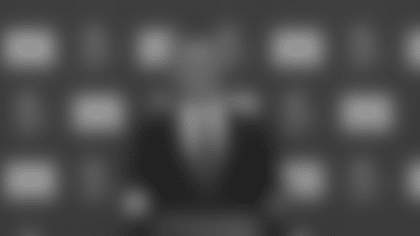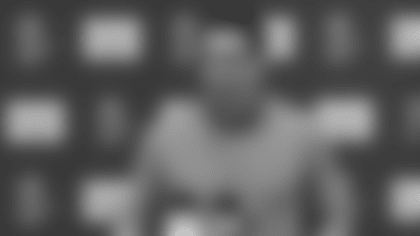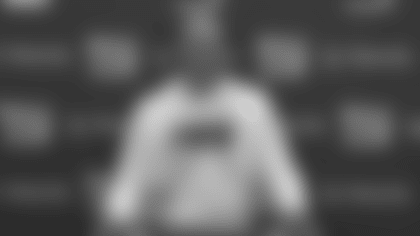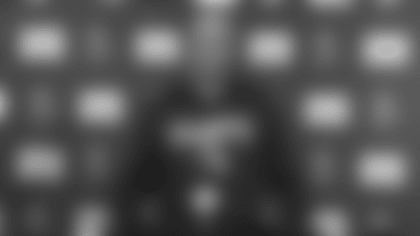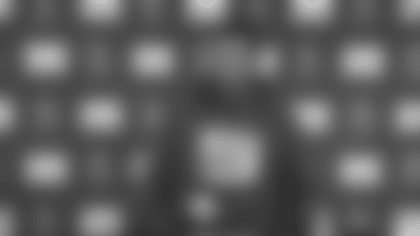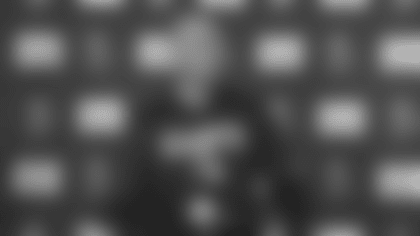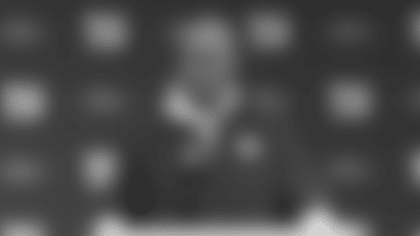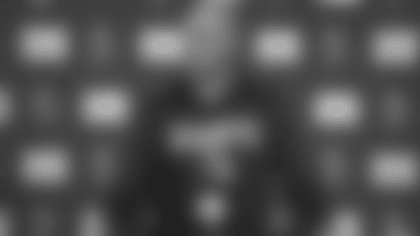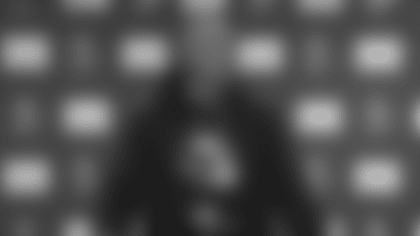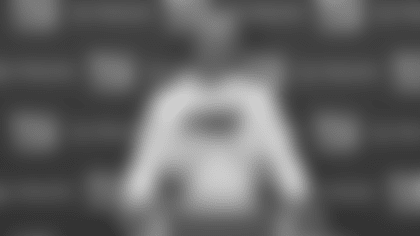Offensive Coordinator Jason Garrett, Assistant Head Coach/Defensive Coordinator Patrick Graham and Special Teams Coordinator Thomas McGaughey spoke to reporters Tuesday on a video chat press conference. Here is what each one had to say.
Offensive Coordinator Jason Garrett
Q: Joe Judge seems to put a real premium on smarts, on his staff and on his players. Can you talk about what that means to you? Also, you and Patrick (Graham) are a unique combo. You're both Ivy Leaguers who are now coordinators. Can you talk about that dynamic and if you and Patrick ever speak about your shared Ivy League experiences?
A: I agree with Coach Judge. The best players we've been around, the best units and teams we've been around, were smart players, units and teams. You have to play smart to have success in this league, and there are a lot of different levels of smart. You have to understand what to do, you have to understand how to do it, why you do it. You want to be good situationally. You want to handle the situations well in the game and play smart in that regard. You want to play winning football. Smart football teams take care of the ball, they don't have penalties, they understand what they need to do in given situations to have success in the situation and how that impacts the game. Those are all things you're trying to preach to your players individually, as units and as a team really each and every day. It starts with preparation. There are different levels of book smart that players that I've been around throughout my career have had. But you have to dig into it, you have to know what we're asking you to do, and then you have to be smart when you get into the different situations in the game to give yourself the best chance to win. In regards to Patrick, just a great experience for me getting to know him. Obviously, I've known him from afar. Different people who have been around him have great respect for him. In the time we've been together, I have a tremendous amount of respect for him and how smart of a football guy he is, the different experiences that he's had, and the ability to work together. When you're a coordinator, often times you have to work together with the other coordinator to help get the practice to function the way you want it to function and how you can compete against each other. But also work together to put your units in the best situation you can. He's been a real joy to work with right now despite the fact that he's a Yale guy.
Q: Is there a pride there? Is there an Ivy League pride between the two of you that comes out?
A: Oh, I don't know about that. I know we're all grateful for the experiences we had back then. Princeton has been a big part of my life. I met my wife there, my brothers went there, my best friends in the world are from there. It's something we just feel really fortunate about to have had that experience.
Q: I wanted to ask you about two of your tight ends. It seemed like Evan (Engram) had a big day yesterday, and everybody kind of knows what he can do in the passing game. What makes you most excited to work with him? Garrett Dickerson seems to have developed a really nice rapport both with Daniel Jones and Colt McCoy. Just your impressions of Garrett so far?
A: Let's start with Evan. Obviously, spent a lot of time on him coming out of the draft and really liked him a lot. I admired him in that evaluation process. Then we played against him, and obviously, with the Cowboys and Giants going against each other a couple times a year, a tremendous amount of respect for him from afar. He's one of those players you're always concerned about having to defend in a game when you're going against him. It's been even better getting to know him. I heard great things about him. Talk about a guy who loves football, wants to work at it and wants to refine his craft and everything he does. He's done an outstanding job from minute one with us. He loves it. You can see it every day. He's engaged in meetings, he works hard at practice. There's this idea that, hey, this is a receiving tight end, this is a play-making tight end. I don't think there's any question about that. But he's also someone who's willing to be a complete tight end and block, block in line and do the things he needs to do to be an every down player for us. He's been fantastic. He has a great thirst for knowledge, a great thirst for trying to understand what we're asking him to do and it shows up in his work every day. In terms of Garrett, he's done a really good job. He has some versatility to him. He can be an on the line tight end, but he also can open up a little bit. He also can come back in the backfield. I think he's shown that versatility. You said it, he's made some plays. It looks like he's comfortable out there. He's done a lot of positive things, both in the run game and in the pass game, the past few days.
Q: I wanted to talk to you about Dion Lewis a little bit. Obviously, he has a lot of experience in pass protection. Watching him in your two-minute stuff the last couple of times you've run it, he seems like a nightmare for guys coming out of the backfield. I know he's kind of made his bones there. But what do you like about what he brings to the table? How does that complement work when you're dealing with, you have a guy like Saquon (Barkley) who's going to get a bulk of attention? How does Dion fit into that mix?
A: The answer is probably pretty similar. I loved Dion coming out of school and admired him from afar. Getting the chance to work with him up close, he's just a real pro. You can tell he loves the game. He works very hard at it. He respects the details of the game and what he needs to do to be a complete back. Don't have this impression that this guy is a receiving back. He's willing to block, demonstrates an ability to run inside and outside in this league for a long, long time. He's a pro. He knows the answers to every question, he embraces the opportunities each day that he gets in them, and you said it. You get him in some of those two-minute situations, he's a very clean protector, he understands who he needs to block when he's asked to do that. But he's also a very good route runner who can beat you when he gets out in space. Again, I admired him for a long time from afar and it's been great to work with him.
Q: Respectfully, I know you didn't want to answer these questions last time, but I have to ask them, obviously. Going back to Dallas and your departure there, do you think that the dragged-out nature of your departure and remaining under contract prevented you from interviewing for head coaching experiences, including this one, that you intended to?
A: Very respectfully, I'm not going to answer questions about Dallas. I'm happy to answer any questions about our Giants team right now, what we're doing here and what we're doing going forward.
Q: I have a Giants question then. Daniel Jones, how long do you… Do you tolerate mistakes since it's early in camp? Whether it's turnovers or just a mistake on a read, at what point do you get to the point where you say, 'Daniel, this has to get better,' 'Daniel, you need to correct this immediately'? Or do you tolerate it because it's a new offense and it's early?
A: I don't know if we ever use that word 'tolerate' as coaches. That's not really in our vocabulary. You don't really tolerate anything. We coach everything every single day with every player we have. That's really what our job is. That's not to say mistakes aren't going to happen. They are going to happen. But you never use the word 'tolerate'. You're always trying to learn and grow from the different experiences that we have. Daniel's done an excellent job. He comes in here and, again, he's so prepared, he's so into it, he wants to know every detail. To play quarterback in this league, or really play any position in this league, there are a lot of different things that happen over the course of a play or the course of a practice. There's so much to learn from. I've never been around a player who played a perfect game. I've never been around a player who had a perfect practice. We're always striving for that. We're striving for excellence in everything we do, and that's really what our objective is. We try to set high standards for our players. We try to give them the tools to achieve those standards. We try to instill belief in them, and we hold those to them each and every day. Daniel is one of those guys who's really embraced that. He's getting better and better in everything we do.
Q: What did you think of his scrimmage and what was it like calling plays?
A: I thought he did a good job in the scrimmage. Again, a lot to learn from. Some parts of it were better than other parts, for him and for our offense. Again, those are great learning experiences for us. Keep going about it the right way, work hard, prepare, and get ready to go. When it's time to go play, go play. Then you come back and clean it up as you go, and hopefully you get better day after day.
Q: The Giants have not been a good screen team for years, as you probably know coaching against them. Not going to get into that. But you come from a program where you had an effective screen game. I'm curious, what are the keys to having a consistent, effective screen pass game? Do you feel this line is developing to one that can be an effective screen pass game?
A: Again, offensive football, you want to attack defenses different ways. It starts with run and pass and then the variety of runs you have and the variety you have in the passing game, whether that's run action passes or play action passes or movement passes or the quick game or the drop back game or screens. That has to be a part of it. We feel like we're capable of doing it. Just my own personal experience regarding the Giants' screens, I know Saquon Barkley has been a real threat throughout his career up to this point on screens, and certainly has been against the teams that I've been around. We believe we can be a good screen team. But again, that's just part of the entire offensive package you're trying to put together to attack a defense different ways.
Q: You had the opportunity to call plays, albeit for a very short period of time, the other day. But I'm just curious how different is the Jason Garrett that calls plays now compared to the last time you called plays? It's been a few years, and obviously, you've morphed with the times as well. Your offense changed even though you weren't calling the plays in Dallas.
A: Yeah, I think the DNA that I have as a person and as a coach, I don't know if that's changed. But certainly, you want to evolve and grow in every aspect of your life and certainly as a coach. Hopefully I've done that with the different experiences I've had. Hopefully I've learned from them. You try to build on the good ones and learn from the ones that aren't quite as good. I think that applies to all aspects of coaching, and certainly to calling plays. One of the things that we tried to do in Dallas with our offense through the years was, it was the same offensive system, but it played differently based on the people that we had. There were some years that we really emphasized the running game and we had success with that. Other years, we had a different personnel makeup and we threw the ball a little bit more. That's a big part of this when you're putting the offense together, to have a system that's flexible enough that you can use the personnel the way you want to and evolve from year to year, evolve within a year based on the personnel you have available, and you're highlighting the strengths of the players and, hopefully, you're protecting some of the weaknesses. That's the process that we're going through right now. Learning our team to get this offense to play as well as it can play.
Q: What does Jason Garrett the play-caller then think of having Saquon Barkley as a guy to build those play calls around?
A: Yeah, great respect for Saquon. Again, one of those guys that we evaluated in the draft. He was a hell of a player at Penn State. Then we had to go against him the last couple of years. He's just a real pro. He comes to work every day always trying to get better, always wanting to learn. You add that with the ability that he has, he can be a dynamic player for us. Certainly, he'll be a big part of what we're doing going forward.
Assistant Head Coach/Defensive Coordinator Patrick Graham
Q: A couple of things. Can you talk about the value that you and Joe (Judge) put on smarts in players? I have another one for you after that.
A: I can't speak for Joe, but for me, I think it's important. You want guys who have some good football awareness and instincts, so I guess that factors into the smart part. The biggest thing is, I could care less about what he is off the field. Not in a bad way, but I could care less about off the field. But on the field, are they able to figure out what the offense is doing? Can they process multiple things that we may give them on a given play? I do think you put a high value on that because it helps you be more multiple, it helps you to do more things. Just more aware players end up making more plays.
Q: You and Jason (Garrett) share a unique bond. You're both Ivy Leaguers. There are not a lot of coordinators in the NFL who are Ivy Leaguers. Do you talk about that much, share your experiences? Is there a pride factor in that?
A: We've talked about it before briefly, but nothing big. I wasn't a good player. He was a good player. It's a totally different situation. He was actually playing in the games. I was really just sitting there on the sideline making sure to keep the bench warm. It was a little different experience. But I'm proud of being a member of that fraternity, if you want to think of it that way. There have been a lot of great players and a lot of great coaches from those schools.
Q: You said you didn't play much at Yale, but you did go to Yale, right?
A: Yeah, no question. I was on the team. I tell people I was on the team. They're like, 'You played at Yale?' I say 'I was on the team. I practiced at Yale.'
Q: You went to classes at Yale, too, though, right?
A: Yes, yes. I enjoyed my experience. I enjoyed my experience.
Q: We were talking to Julian Love the other day and he was talking about how he spent most of his career bouncing around from position to position. A lot of times in a scheme, that's not a good thing. It seems like that's almost the perfect thing for something like you're trying to run here. How does he fit into this rotation, into this fluid secondary that you're trying to put together?
A: I think the thing about Love that stands out, piggybacking off the previous question, he is a smart football player, on and off the field, in terms of his awareness with the situations, awareness of personnel the offense is giving us. The fact that he's able to see that and dissect that, that's been a good thing for us. The fact that he's played multiple positions, whether he's been a corner, whatever he's played, that's a positive because it gives us an opportunity to use his skillsets. Whether it's covering a receiver from coming down, or covering a receiver and he's down there, covering a back from depth or lining up to cover a back, he can use his skillset to handle that. Because he understands the bigger picture, because he's played in multiple spots, it makes it even more interchangeable if that makes sense.
Q: I like your old-school hat too by the way.
A: Oh thanks. My brother got this for me.
Q: I wanted to ask you about something Coach Judge said to us a little while ago. He complimented you for taking Miami's defense last year, building it and then by the end of the year, it was starting to play really well. I just wanted to go back to that for a second. When you have all kinds of holes, all kinds of questions, just putting it all together, what was the key for you, especially since you had so many young players there like you do now?
A: First off, I appreciate that but any improvement is really the players and Coach (Brian) Flores' vision in terms of what he wanted us to do as a defense and how we grew over the time I was there. But in terms of what I try to do as a coach, I tell them all the time, I focus on their fundamentals. Football position, where are their eyes, are we playing with our hands, are we playing with a good base? I really think that's a majority of what I'm coaching. Then once we get into the season, I started to introduce those guys, especially when you're dealing with young players, NFL football. It's different. It's just a different game. It's people based. You have to know who you're going against. It's not, 'Oh, we're running Pat Graham's scheme.' It's not that. It's about 'Ok, who do we have and how can we take advantage of their weaknesses? Who do they have that we have to take away?' As you build through the year, you try to introduce that and teach those guys those aspects. It takes time. To be honest with you, it takes time. Once they get it, it doesn't matter… It's third and seven, but does it matter what I call or does it matter do we know who they're throwing the ball to? Does that make sense? It takes time for them to get over the fact, 'Ok, I'm playing outside leverage, it's cover one, I'm going to post safety blah blah blah.' Then to the point where it's, 'Ok, they're throwing the ball to 83. We have to take him away. What are my tools to do that?' It takes time to build that. It's not just third down. It's early down, red area, wherever it may be. But it takes some time to do that. Just like anything, when you're teaching, I don't want to say kids but the young players, inexperienced players, they need to experience that in order for them to grow and really be able to utilize their tools because they make all the decisions out there on the field. It's split-second decisions. That's why they're the elite of the elite. You just try to do your best job to get them ready for those moments.
Q: I wanted to ask you about your two rookie defensive backs. Darnay (Holmes) seems like he's been a pleasant surprise, especially with his ball skills. And just what you've seen from Xavier McKinney so far with the guys being out there for a whole week, then with the scrimmage, obviously, this past Friday.
A: Both of those guys… It's not just them. We have a bunch of young guys that are working their tails off. But they come in, they go to work. Darnay and Zay, I call him Zay, but Darnay and Zay go to work. They come in, they're prepared, they're ready for meetings. I think they're being really diligent outside of the building in terms of they're coming in with the right questions the next day. You can tell they've already watched the tape before we even get to it because they're being real serious about their craft. I can appreciate that because a lot of times, it takes a while to learn that. They didn't have the spring to be around the vets. Ok, you don't have the spring to be around the vets, so how are you learning that? They're kind of catching up right now and understanding the work that you have to put into it. But it's been a positive. Whether it's a surprise or not, I can't speak on that, but we wanted these guys for a reason. Our scouting department and Mr. (Dave) Gettleman, they did a great job of IDing these guys as people we want on our team through collaboration with the coaching staff. But these guys, they're good kids, they work hard, they still have a ways to go, and they know that. Thankfully, well I don't know if they'll say thankfully, but we remind them they have a ways to go all the time. But they're working hard and hopefully it all comes to fruition out there on the field if we keep going through this.
Q: Obviously, you guys were thrown a bit of curveball expecting DeAndre Baker to be there, especially on the outside. Is there anything about what you've seen from Darnay that makes you think he can thrive at that outside spot?
A: The thing I found out about the NFL, every year, every week, every day is different. You don't want to get caught off guard by surprises or whatever it may be. Every day is different. Then guys that are here are the guys we are working with. All these guys are competing for the spots out on the field. There are eleven spots on the field any given down. Based on the situation, based on what game and who is available. Those guys are all competing. To speak specifically about Darnay or Zay, they are all out there competing for spots. I don't know who is going to be out there, we could have four corners out there, we could have two corners out there. They are all learning multiple spots trying to figure out the more I can do, the more value I have. The easier it is to make the team, the more value you have, if that makes sense.
Q: When we talk about the pass rush, I think a big part of it is the interior part as well. It sometimes gets overlooked. You don't have a lot of guys there with huge track records as pass rushers. Maybe Leonard Williams is the only one as a real pass rusher. When you look at your outside guys, do you look at which ones could potentially help you by moving and sliding inside on rushing downs.
A: To me, when you are talking about the interior of the pass rush, whether it's third down, early down or whatever it may be, you are talking about some push in the middle. You are looking for some push. In this league, we run around the edges all the time, the quarterback is going to step up and make the easier throw in the middle. We have to get some push. That could be with the big guys, that could be with the smaller guys. I think we evaluate the whole roster in terms of that. The more the guys can do, the better off we will be. Do I like to mix in a defensive end on the inside? Absolutely, because it's a different skill set going in there over a guard, over a center. Do we like to use a backer to maybe be the inside part of the pass rush? Not to harp on (inaudible) or anything, but I just think it's important for him to understand what we're talking about with the pass rush. We want to contain the quarterback and we want to make sure we are getting push up the middle. We want to really cage that guy up and then guys win their one on one battles and that's how we get some production in terms of the sacks, the QB hits and things of that nature. I like to mix it up because we want to try to highlight each guy's talent. If Pat Graham is rushing, my talent might be better suited for the guard as opposed to for a tackle. Your skills might be better suited for a tackle. It's all interchangeable in my opinion and the guys are embracing it.
Q: Heading into Friday night, I know Joe has said, even last week in the intrasquad, that you and Jason were going to try and go live. How much more intensity or urgency do you feel come Friday night. Knowing that we're here and you are doing a great job explaining everything and keep saying it's going to take time, but also know the finish line is coming up September 14th. Do you feel that urgency of needing to get this team ready to go on the defensive side of the ball?
A: Right, wrong or indifferent, I feel urgency every day. I wake up in the morning, and I don't know if there is enough hours in the day to get done what I want to get done. We try to plan that out. I think realistically the goals you set in terms of installation, in terms of awareness, you have to plan that out throughout the year. We have to be ready to go for Pittsburgh, there's no question. Do I feel the urgency of that? Absolutely. Less than 21 days and here we go, we are playing one of the best teams in the world. There's some urgency. With a good quarterback, good backs, good o-line, great head coach. You are dealing with a lot there. You have to trust the process. The beauty of working for Joe is his vision and how he has set it out since he got the job. We know what we want it to look like. We are trying to build towards that, we want to be a tough team. We want that the jump off the film. We have to put in the necessary work over the next 20 days to make sure we get there for that. The head coach set the vision, we know what we want it to look like. We don't want to beat ourselves with dumb penalties. We want to eliminate bad football. We want to make sure on defense we can tackle, get off blocks, defend the deep part of the field. We laid out the plan for that, now it's all about executing. Do we have 20 days left? Yeah, we have 20 days left to do it. We have to figure it out. Everybody is in the same boat. Everybody else is dealing with 19 days besides us, the Steelers, San Fran and whoever else the Monday night game is. Twenty-eight other teams are dealing with 19 days. Everybody has to feel that urgency. In this league, if you don't feel a sense of urgency every single day, you will get passed by.
Q: Will you do any game planning whatsoever for your guys for Friday night?
A: I think realistically to help them play fast, you have to cut the menu and explain to them what the menu is for the night. For myself mentally, what you realize is, you are rusty, too. The first time you are calling it live and oh, am I seeing the situations, am I hearing everything the right way? In order to get myself working towards the process of getting ready for a game, you have to cut it down, it helps the players cut it down. So I can make sure I am in tune with the situations, the personnel units going in and out. Get done what we want to get done. Go over the 'must' for the day. With all that being said, I'm looking forward to it, it's going to be a challenge. I need it, I'll tell you that much. There's no question, the last time I called a game was in December. I need it and I'm looking forward to it. I know I'll be better than last week, this week. Hopefully I'll be better the following week than I was this week. It has to be constant improvement. No different than what we tell the players, get better every day, that's what I'm trying to do.
Special Teams Coordinator Thomas McGaughey
Q: Joe was talking about because of the protocols, it might be hard getting a substitute player in for special teams. Let's say kicker or punter. Who are your emergency guys? Can Riley kick and Gano punt?
A: Graham Gano was a punter in college. Not only was he a punter, he was an outstanding punter in college. We have protocols in place. We have a lot of great athletes here that can do a bunch of different things. It's amazing what you will find when you start to look. These guys have been stud athletes their whole lives. We have a plethora of guys that can snap, we have a ton of guys that can kick, we have bunch of guys that can punt. If we ever get caught in a pinch, I don't think it will be an issue.
Q: Who are some of the well-known guys or some of the guys we don't know about who might be the guys you put in there?
A: Just know we have a few guys, we have options. Guys are very talented, and they work their tails off. We've done a good job as a staff identifying those guys. Just know moving forward if that comes up, we'll be prepared for it.
Q: Is that something you go through every season, or is that because of the special circumstances of this season? That you are looking under every rock.
A: We always identify guys. A lot of these guys haven't done some of these skills since high school, so you just never know. You are always looking for back ups in emergency situations. This year more than ever, you want to do a better job of identifying guys and just trying to turn over every rock. See what kind of skills everyone has so we can maximize the roster from the top down and the bottom up.
Q: You lost Cody Core since last time we spoke. What does that mean to your unit?
A: It always hurts to lose a guy like Cody. Love him to death, he was very productive for us. It gives an opportunity for the next guy to come up. See who can step up and take his spot. It's always the next man up. We have to keep rocking, keep moving forward and we'll see where we end up.
Q: Some of the guys who might fill the gunner role, David Sills, Alex Bachman, Austin Mack. What kind of skills do those three in particular have that can help you on special teams or that they have shown you so far?
A: Anybody that plays that position is going to show, first, a propensity to be able to run very fast. That's the key to that position. You have to be able to navigate space in a hurry. All those guys are out there working, they are all doing a good job. We just have to find out throughout the process who can do what and who is going to do well at it, who has the most upside.
Q: When you coached against Joe Judge, special teams coach versus special teams coach, what did he do well as far as being his competitor and how you prepared for him when he was in New England?
A: Joe did a great job of attacking your weakness. He would make you play with your left hand. His guys were super prepared, they always had a veteran group that you knew they weren't going to make any mistakes. That's what you knew when you were going against New England, they were going to be disciplined, they were going to play fast because they were going to have a great unit. They weren't going to make any mistakes, you had to beat them. You knew going against Joe's units they were always going to be prepared and detailed.
Q: You were talking about Joe and he always talks about smart players. Do you sense even more of an emphasis on having smart players, coaching them smart? You are the only coordinator on this team who is not from the Ivy League. Do you guys talk about your shared experiences and the value of smarts among the coordinators as well.
A: It is extremely important that we understand what's going on and how we want to implement it. It's not about what we know and how smart we are. It's all about what the players know and how you can teach it. To me, that's the most important thing. It's getting the information to the players where they can digest the information and then give it back to you. That's the most important thing. Being able to execute on game day the information that's being given in the meetings, taking it to the field and being applied during the course of a game.
Q: Do you sense from the two coordinators who are both Ivy Leaguers that they are supposed to be a little different.
A: Absolutely, Jason and PG are very, very sharp men. When you are around them, you get that. When you have conversations with them, you get that. The Ivy League education has definitely jumped off the screen to me.
Q: I don't think we have talked to you since Graham Gano was added to the roster. What are your thoughts on what Graham brings and being reunited with him again?
A: Graham brings a stability to the position. Obviously, a former Pro Bowl kicker. Just a veteran player in this league. He brings experience, he brings leadership, and he's a good person. I'm excited to have him here. He's been really good for our room, even in the short time that he's been here. Graham is Graham, he's just a good man. He works his tail off, he's a professional field goal kicker, that's what he is. He goes about his business the way he is supposed to and hopefully once we get rolling, he is going to be his old self.
Q: I don't recall us asking you about Casey Kreiter when you guys signed him in free agency. What does he bring to the position? Obviously, this is a franchise that hasn't really been looking for a long snapper for a while. What did you like about his game? I know we are not really analyzing him much in the summer. What do you like about him
A: Casey's a veteran player, he's been around, he's a good man. He works his tail off and he's exactly what you want in a long snapper. He's consistent, he does his job and you want to be seen and not heard.
Q: When you guys were out there considering what holes to fill, was he a guy on your list if the front office came to you looking for recommendations?
A: Absolutely, Casey is a solid snapper. He has experience in the league and we just look forward to getting all three of those guys together and becoming the best we can possibly be.
Q: Just going back to Cody Core, you have always had a core group of special teamers. In listening to coach Judge, Jason and Pat, they always talk about mixing and matching guys according to the competition and the opponent that week. Is that something you think you are going to be doing a lot more of with your unit as well this season?
A: We're always looking to find a way to get an advantage on the opponent. Who knows, this is a new season, a different situation, with COVID and all this stuff, it's just different. Who knows what the season brings? We're just going to keep working hard, keep doing what we're supposed to do. Evaluate the guys that we have, keep trying to get them better. We'll see where we end up.
Q: From a special teams perspective, does it make sense to have a core group that you run out at the same positions every week? Does it give you an advantage to mix it up a little bit?
A: Any time you can create continuity, that's what you want. Sometimes you have to make do with what you have. For me as a coach, that's my job. As Special Teams Coordinator, that's my job. That's the essence of my job, to make the gumbo every week. Sometimes it might chicken gumbo, sometimes it might be shrimp gumbo. Whatever I have, that's what you have to work with. You have to work it out, that's the process of being the special teams coach in the NFL.
Q: You mentioned before that Joe's groups were always veteran groups. He is not going to be a guy who is afraid to put veterans and even starters on the field for special teams. He puts a premium on it. What does that mean for you for punt return options? What do you see from those guys, mainly your wide receiver group?
A: We've had starters out there before. Last year, we had Jabrill (Peppers), last year we had Golden (Tate). That's a play making position. You are trying to put guys back there that are going to make plays. To me, that's no different than the quarterback position, the wide receiver position, the running back position. You are trying to put guys in a position that you want to make plays. The game has come down to primarily punt and punt return to get the most plays during those two. You want to be able to maximize the field position by being able to make plays and put your best players back there.
Q: What do those guys bring you? Specifically Sterling, Golden, Darius.
A: Consistency. Golden was great for us last year, he did a heck of a job fielding the ball and getting the drive started with a first down. When we got a chance to use Jabrill back there, he did a good job for us. That process and using those guys and having access to them is huge.
Q: I don't think I have seen many live or even half-speed kickoff returns in practice. Is that something that's concerning because obviously you want to see what you have back there? Is that something we will see more of on Friday at the stadium?
A: You will see more of it moving forward. That's part of the evaluation process. We want to ramp these guys up, we don't want to just throw them out there. We are trying to get them into shape, but we want to be smart in how we operate, too.
Q: Do you think the kid Javon Leake from Maryland is an option on kickoff return?
A: We have a bunch of options. We have at least five or six guys that are out there working. He's definitely one of them, he's working his tail off. All those guys are out there doing a good job and we just have to see where they end up. We're going to ramp that up pretty quick.

Giants App
Download the Giants' official app for iPhone, iPad and Android devices




